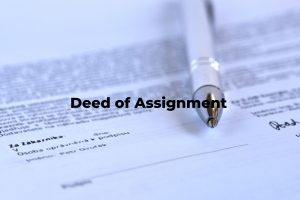In the realm of legal transactions in Australia, a Deed of Assignment holds significant importance. This legal document serves as a powerful tool for the transfer of rights and obligations between parties. Whether in the context of real estate, intellectual property, or other contractual agreements, a Deed of Assignment plays a crucial role in facilitating the seamless transfer of assets.
Deed of Assignment
A Deed of Assignment is a legally binding document that allows one party, known as the assignor (the party relinquishing the rights, benefits, or obligations), to transfer specific rights, benefits, or obligations to another party, referred to as the assignee (the party receiving the assigned rights, benefits, or obligations).
This legal instrument is commonly employed when there is a need to assign contractual rights, such as in real estate transactions, business sale transactions, intellectual property transfers or the assignment of debts. The deed must be properly executed and delivered to be legally effective.
Key Clauses of Deed of Assignment
A clear and concise description of the intention to assign, the rights, benefits, or obligations being transferred should be outlined in the document.
In many assignments, there is a consideration involved, which refers to the value exchanged between the parties. This could be in the form of money, services, or any other agreed-upon consideration.
The assignor typically provides assurances that they have the legal right to transfer the specified rights and that these rights are free from any encumbrances, and the assignee normally guarantees to perform specific contractual obligations under the specified rights.
Covenants are promises made by one or both parties regarding their future actions. For example, the assignor may covenant that they will not interfere with the assigned rights after the transfer and the assignee covenants that it will take over the obligations of the assignor under a specific contract.
The indemnity clause outlines the responsibilities of the parties in case of any losses or liabilities arising from the assignment. For example, it specifies which party will bear the costs associated with legal challenges or disputes.
Common Uses in Australia
Real Estate Transactions
Deeds of Assignment are commonly used in the transfer of property rights, for example, in the sale of off-the-plan properties or when a buyer wants to transfer their rights under a property contract to another party.
Intellectual Property
Artists, authors, or inventors may use Deeds of Assignment to transfer their intellectual property rights, such as trade marks, copyrights or patents, to another individual or entity.
Debt Assignment
Assignments of debts are also facilitated through Deeds of Assignment. This occurs when a creditor transfers their rights to collect a debt to another party.
Contractual Agreements
Businesses often use Deeds of Assignment to transfer contractual rights and obligations when there is a change in ownership or a need to delegate specific responsibilities, for example, the assignment of leases or supplier contracts.
The IP House Lawyers has assisted many of our clients in drafting, preparing and executing various forms of Deed of Assignment. Please contact us on the details below if you need any assistance in relation to drafting and preparing a Deed of Assignment.
For any further information or queries on the above content, please contact us.
The Author
Jean Kallmyr | Lawyer, The IP House Lawyers | t: 0435 799 831 | e: admin@theiphouse.com.au
Key Contact
Claire Darby | Managing Director/Lawyer, The IP House Lawyers | t: 0412 998 951 | e: claire@theiphouse.com.au
Disclaimer
The information and contents of this publication do not constitute any legal or financial advice. This publication is intended only for reference purposes for The IP House Lawyers’ clients and prospective clients.
Image by montypeter on Freepik

